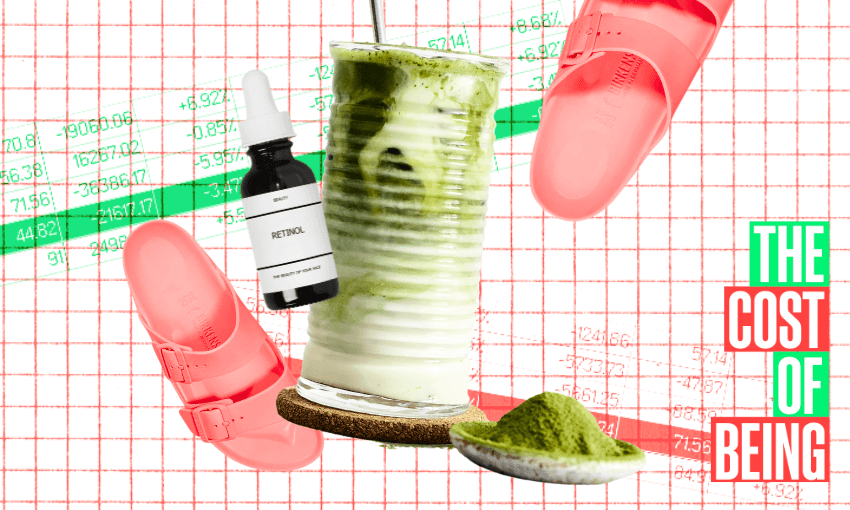As part of our series exploring how New Zealanders live and our relationship with money, a 22-year-old explains how her upbringing has contributed to her being in a ‘constant state of saving for a rainy day’.
Want to be part of The Cost of Being? Fill out the questionnaire here.
Gender: Female.
Age: 22.
Ethnicity: Chinese.
Role: Postgraduate student, working two jobs for the university (teaching assistant and research assistant).
Salary/income/assets: $546 per week (half of this is a postgraduate scholarship stipend and other half is wages).
My living location is: Urban.
Rent/mortgage per week: $0. I am lucky to live at home!
Student loan or other debt payments per week: $13k in student loan debt (thank you first year free).
Typical weekly food costs
Groceries: $20 per week (personally pay for). I live at home, so most of my groceries are covered! When I used to flat earlier in the year, I paid $70 a week for myself.
Eating out: $25.
Takeaways: $0.
Workday lunches: $15
Cafe coffees/snacks: $15
Other food costs: –
Savings: I do manage to save a fair chunk of my income every week through living at home and just generally living below my means. A big portion of my savings has gone towards travelling (I saved $12k for a three-month trip to Europe last year) and I have about $18k saved for another four to five-month travel stint later this year. I have another roughly $30k in my general savings (note: I have been working since I was 15, which really helps to build up your savings).
I worry about money: Always.
Three words to describe my financial situation: Disproportionately anxious, trying-to-overcome-a-scarcity-mindset-from-upbringing-lol.
My biggest edible indulgence would be: An overpriced matcha or sweet treat for a serotonin/motivational boost during week.
In a typical week my alcohol expenditure would be: $10? I’m trying to save at the moment, so haven’t been drinking much.
In a typical week my transport expenditure would be: $30 for public transport.
I estimate in the past year the ballpark amount I spent on my personal clothing (including sleepwear and underwear) was: $300-$500? I buy most things secondhand for environmental and economic reasons.
My most expensive clothing in the past year was:$90 handmade custom top I bought from a small business. I don’t usually spend this much money on clothing, but I’m happy to pay more if I know it’s going towards a local/small business owner.
My last pair of shoes cost: $88, they’re the EVA Birkenstocks.
My grooming/beauty expenditure in a year is about: $250-350. I have bangs that I refuse to trim myself bc of my lack of hand-eye coordination skills, which does rack up a maintenance bit of a bill going to the hairdressers. As for makeup and skincare, I use the same products until they’ve run out to reduce wasteful consumption and I don’t have the skills/time for a complicated routine anyway.
My exercise expenditure in a year is about: $0.
My last Friday night cost: $45 roughly.
Most regrettable purchase in the last 12 months was: Maybe some retinol/vitamin c skincare that I don’t use but got sucked into buying bc of Tik Tok??
Most indulgent purchase (that I don’t regret) in the last 12 months was: Probably dropping $12k to spend three epic and unforgettable months in Europe. That sounds like a lot of money, but I was visiting on a budget, staying in hostels and cooking a lot of my meals.
Five words to describe my financial personality would be: Environmentally-conscious, anxious, but working on it!
I grew up in a house where money was: Scarce. I grew up in a low-income household where money was always a topic of stress and conflict. The anxiety my parents experienced around money, and their scarcity mindset (which a lot of low-income immigrant parents unconsciously have), has definitely affected my relationship with spending and saving. I feel like I am disproportionately anxious when it comes to money, especially more than my peers, which has caused me to be in a constant state of saving for a rainy day (on top of normal savings goals). An explanation for this is that I’ve internalised, from a young age because of my parents’ financial struggles, that money is hard to come by and you never know what could go wrong in life. While this means that I have a good work ethic and discipline with money, it takes a toll on your mental health worrying about money all the time. I am trying to work on distancing myself from the limiting beliefs around money, but it’s hard unlearning deep-rooted fears/insecurities!
The last time my Eftpos card was declined was: –
In five years, in financial terms, I see myself: Hopefully financially stable and secure.
I would love to have more money for: A house down payment, but that seems like a delusional prospect in Auckland.
